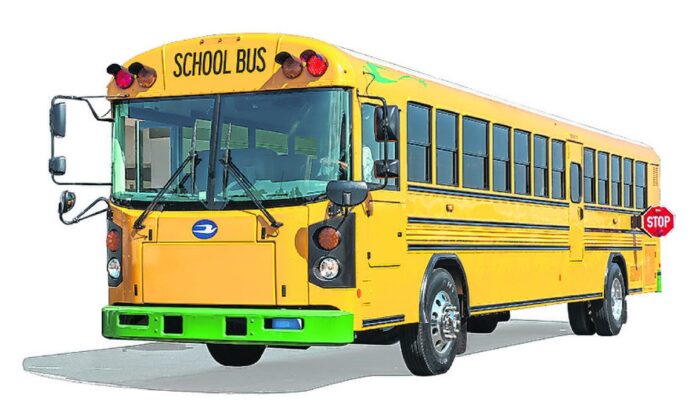
Bartholomew Consolidated School Corp. is one of four Indiana school districts selected to receive a $315,000 grant to purchase one all-electric school bus.
The grant comes from the Indiana Volkswagen Environmental Mitigation Trust Fund Committee, which met Tuesday and approved the first round of funding from the National Volkswagen Mitigation Trust. The grants fund transformative projects aimed at reducing diesel emissions and improving Indiana’s air quality.
Brett Boezeman, BCSC director of operations, said the corporation already had an interest in looking at alternative fuel school buses, specifically electric buses to reduce carbon emissions and save fuel costs for the school corporation. Basic all-electric buses run for more than $300,000 in purchase costs whereas basic diesel buses run anywhere from $80,000 to $85,000 — a significant difference.
“Basically our biggest hurdle was the cost of these (electric) buses,” Boezeman said. “It’s new technology and they’re just very expensive. We also ‘spec’ our buses with a lot of safety equipment, and all those things add money to the bus.”
[sc:text-divider text-divider-title=”Story continues below gallery” ]
Boezeman traveled to California earlier this year to view several electric bus models and ride them on bus routes. He also talked to drivers to learn how the buses perform, what safety features are included and how maintenance is performed.
After BCSC learned about the money available from the Volkswagen settlement, district officials applied for a grant from the Indiana Volkswagen Environmental Mitigation Trust Fund Committee to fund one electric bus. Three school districts in Monroe, Carroll and Hamilton counties also applied for a grant for all-electric buses.
Boezeman represented BCSC Tuesday at the Indiana Volkswagen Environmental Mitigation Trust Fund Committee’s meeting and offered additional input for how BCSC could benefit from the funding. The input was in addition to an application submitted earlier this year.
The applications were scored against one another, using the effectiveness of the proposal, cost savings and emission reduction potential as evaluating criteria. Boezeman said BCSC scored highest among the four schools at 87. Monroe County Community Schools ranked No. 2 at 51.
Cummins Inc. and Duke Energy are partnering with BCSC to fully fund and support the initiative through financing, data collection and evaluation. Boezeman said BCSC does not plan to pay out of pocket to purchase the bus.
Julie Furber, vice president of electrified power at Cummins, said the company is thrilled to bring an electric bus to Bartholomew County. Cummins recently joined the all-electric school bus initiative this year with the PowerDrive 7000 EV to rapidly enable school bus manufacturers to quickly create electric school bus solutions. The PowerDrive electric motor is maintenance-free, eliminating downtime and costs associated with maintenance.
“This collaboration showcases Cummins’ latest innovations while supporting our community,” Furber said. “We can’t wait to see a Cummins-powered electric school bus safely transporting our community’s youth.”
The bus will produce zero emissions and will be free of any gasoline, running on one large battery, which Boezeman anticipates will be charged every evening. Because there is no need for engine oil changes, and no transmission or engine to maintain, electric buses have a lower cost of maintenance than a traditional diesel bus.
“This shows the community that we care about the environment,” Boezeman said. “We care about the air quality in the neighborhoods and around the schools. It’s just one bus — one small step. We’re environmentally conscious of what we’re doing.”
Boezeman said the corporation expects to save fuel costs with the new bus, but said it’s too early to estimate how much money will be saved.
The bus takes about one year to build and must be rolled out by Dec. 31, 2020. Boezeman said his goal is to have the bus assigned to and driving a route by November 2020.
This was the first round of funding for on-road and non-road projects and totaled more than $9.8 million. The funds will be used for clean air projects that will significantly reduce diesel emissions across Indiana. Twenty three counties received a total of 179 vehicles or equipment as part of the project.
[sc:pullout-title pullout-title=”About the grant” ][sc:pullout-text-begin]
The $9.8 million funding is the result of a consent decree between the U.S. Justice Department, the Volkswagen Corp. and its subsidiaries addressing the installation and use of emission testing defeat devices in certain vehicles sold and operated in the U.S. from 2009 through 2016.
The Indiana Volkswagen Environmental Mitigation Trust Fund Committee was formed by Gov. Eric Holcomb in 2017. The committee plays a role in the disbursement of Indiana’s share of funds from the Environmental Mitigation Trust created as part of Volkswagen’s settlement of Clean Air Act violations regarding diesel emissions from its vehicles. Indiana will receive approximately $41 million under the terms of the consent decree.
[sc:pullout-text-end][sc:pullout-title pullout-title=”What is an all-electric school bus?” ][sc:pullout-text-begin]
Electric school buses produce zero emissions and are free of any gasoline, running on one large battery. Because there is no need for engine oil changes, and no transmission or engine to maintain, electric buses have a lower cost of maintenance than a traditional diesel bus.
[sc:pullout-text-end]




